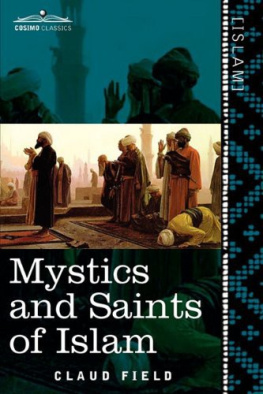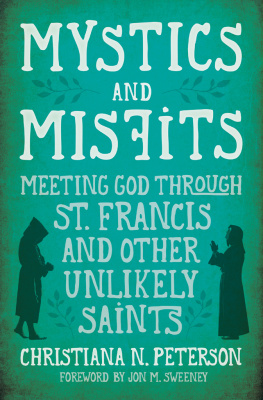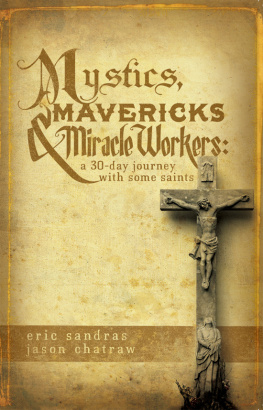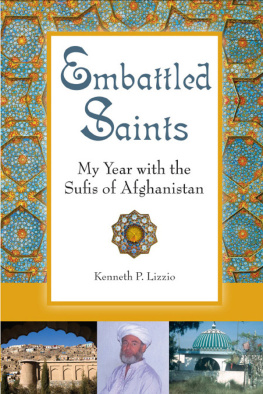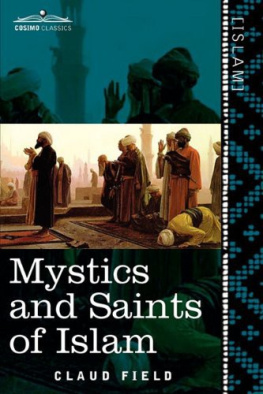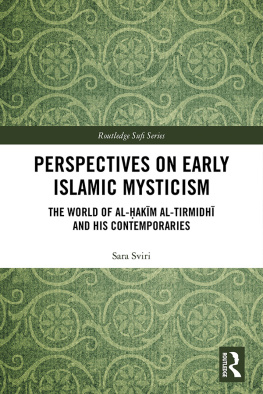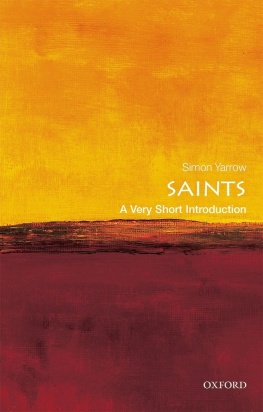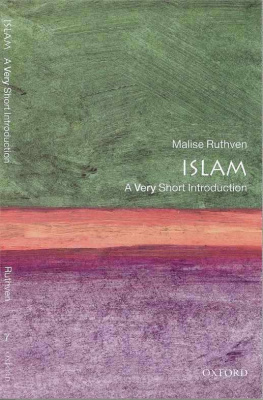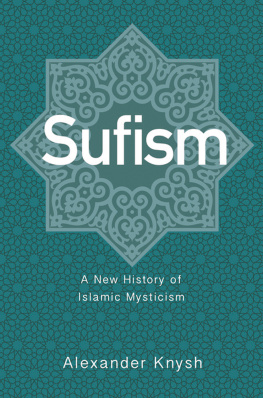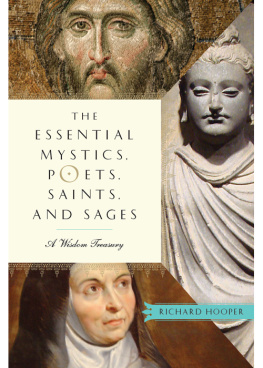The Project Gutenberg EBook of Mystics and Saints of Islam, by Claud Field
This eBook is for the use of anyone anywhere at no cost and with
almost no restrictions whatsoever. You may copy it, give it away or
re-use it under the terms of the Project Gutenberg License included
with this eBook or online at www.gutenberg.org
Title: Mystics and Saints of Islam
Author: Claud Field
Release Date: January 15, 2008 [EBook #24314]
Language: English
*** START OF THIS PROJECT GUTENBERG EBOOK MYSTICS AND SAINTS OF ISLAM ***
Produced by Marilynda Fraser-Cunliffe, Turgut Dincer and
the Online Distributed Proofreading Team at
http://www.pgdp.net (This file was made using scans of
public domain works from the University of Michigan Digital
Libraries.)
MYSTICS AND SAINTS
OF ISLAM
BY
CLAUD FIELD
london:
FRANCIS GRIFFITHS,
34 Maiden lane, strand, W.C.
1910.
CONTENTS.
| CHAP. | PAGE |
| I. | PANTHEISTIC SUFISM |
| II. | HASAN BASRI |
| III. | RABIA, THE WOMAN SUFI |
| IV. | IBRAHIM BEN ADHAM |
| V. | FUDHAYL BEN AYAZ |
| VI. | BAYAZID BASTAMI |
| VII. | ZU'N NUN OF EGYPT |
| VIII. | MANSUR HALLAJ |
| IX. | HABIB AJAMI |
| X. | AVICENNA (IBN SINA) |
| XI. | AL GHAZZALI |
| XII. | FARIDUDDIN ATTAR |
| XIII. | SUHRAWARDY |
| XIV. | JALALUDDIN RUMI |
| XV. | SHARANI, THE EGYPTIAN |
| XV. | MULLAH SHAH |
| APPENDIX | I. | MOHAMMEDAN CONVERSIONS |
| " | II. | EXPOSITION OF SUFISM |
| " | III. | CHRISTIAN ELEMENTS IN MOHAMMEDAN LITERATURE |
| " | IV. | CHRIST IN MOHAMMEDAN TRADITION |
PREFACE
It is a custom in some quarters to represent Mohammadan mysticism as merely a late importation into Islam, and an altogether alien element in it. But however much later Islamic mysticism may have derived from Christian, Neo-platonic, and Buddhist sources, there is little doubt that the roots of mysticism are to be found in the Koran itself. The following verse is an instance: "God is the Light of the heavens and the earth. His light is like a niche in which is a lamp, the lamp encased in glassthe glass as it were a glistening star. From a blessed tree is it lighted, the olive neither of the East nor of the West, whose oil would well nigh shine out even though fire touched it not! It is light upon light!" (Koran Sura 24).
Indeed it seems strange to accord the title of "a practical mystic" to Cromwell and to deny it to Mohammad, whose proclivity for religious meditation was so strong that the Arabs used to say "Muhammad is in love with his Maker,"
This "fear of the Lord" led naturally to an almost fierce asceticism. Abu Bekr and Ali both founded communities of ascetics, and during the first and second centuries of Islam there were many orthodox mystics. Professor Nicholson in the work just quoted, rightly says "I do not think that we need look beyond Islam for the origin of the Sufi doctrines.... The early Sufis are still on orthodox ground, their relation to Islam is not unlike that of the medival Spanish mystics to the Roman Catholic Church."
The following sketches are for the most part translations of papers by continental scholars such as Alfred Von Kremer, Pavet de Courteille, and A.F. Mehren. The essays on Ghazzali and Jalaluddin Rumi are, however, founded on original study of those writers. The translator hopes a wholesome tonic may be found in some of these Moslem mystics at a time when many "Christian" pulpits and presses seem anxious to dilute Christianity "into a presumptuous and effeminate love which never knew fear."
He desires to thank the Editors of the Expository Times, Church Missionary Review, Irish Church Quarterly, and London Quarterly Review for permission to include papers which have appeared in those journals.
C.F.
Ghazzali, Munqidh.
Nicholson. Literary History of the Arabs (p. 225).
Tholuck. Sufismus.
Sir John Seeley.
CHAPTER I
PANTHEISTIC SUFISM
I. THE IMPORT OF ISLAMIC MYSTICISM
The moral law proclaimed by Moses three thousand years ago agrees with that which governs men to-day, irrespective of their various stages of culture; the moral precepts of a Buddha and Confucius agree with those of the Gospel, and the sins for which, according to the Book of the Dead of the ancient Egyptians, men will answer to the judges of the other world are sins still after four thousand years. If the nature of the unknown First Cause is ever to be grasped at all, it can only be in the light of those unchanging moral principles which every man carries in his own breast. The idea of God is therefore not an affair of the understanding, but of the feeling and conscience. Mysticism has always so taken it, and has therefore always had a strong attraction for the excitable and emotional portion of mankind whom it has comforted in trial and affliction. Every religion is accordingly rather intended for the emotions than for the understanding, and therefore they all contain mystical tendencies. The mysticism of Islam and Christendom have many points of contact, and by mysticism perhaps will be first bridged the wide gulf which separates Islam from Christendom, and thereby from modern civilisation. Just in proportion as the various religions express the ideals of goodness and truth they approximate to one another as manifestations of the unchanging moral principle. Inasmuch as they surmised this, the Motazilites (or free-thinkers in Islam), at a time when Europe lay in the profoundest intellectual and moral bewilderment, fought for one of those ideas which, although they are quickly submerged again in the stormy current of the times, continue to work in silence and finally emerge victorious. On that day when the Moslem no longer beholds in God simply omnipotence, but also righteousness, he will simultaneously re-enter the circle of the great civilised nations among whom he once before, though only for a short time, had won the first place.
It is not perhaps too fanciful to hail, as an omen of the triumph of moral mysticism over the dogmatic rigidity of Islam, the fact that the present Sultan Muhammad V. was girded with the sword of Osman by the head of the Mevlevi dervishes, a sect founded by the great mystic teacher Jalaluddin Rumi of Iconium. Forty-three years ago a Persian Orientalist Mirza Kasim Beg wrote in the Journal Asiatique:
"L'unique voie qui dans l'Islam puisse conduire la reforme c'est la doctrine du mysticisme."
II. EARLIER PHASES
The period during which the asceticism practised by the earlier Sufis passed into the dreamy pantheism which characterises the later Sufism is the end of the third century after Muhammad. This introduced a new element into Islam which for centuries exercised a powerful influence on national culture, and is still partially operative at present. The conception of God and of the relation of the finite and human with the infinite and divine from this time onward formed the chief subject of inquiry and meditation.
The man who was destined to be the first to give those ideas, which had hitherto been foreign to Arabian Sufism, definite expression was a poor workman, a cotton-carder, bearing the name of Hellaj. He was an Arabised Persian, born in Persia, but educated in Irak, where he enjoyed the privilege of being instructed by Junaid. The story of his life as handed down by Shiah or Sunni writers has been much exaggerated. It is clear, however, that he had a great number of disciples who revered him as their spiritual guide and ascribed to him almost supernatural powers. His ever-growing popularity much scandalised the orthodox mullahs, who moved the authorities to proceed against him, and were successful in procuring his execution 922 a.d. Before his death he was subjected to terrible tortures, which he bore with wonderful composure.

